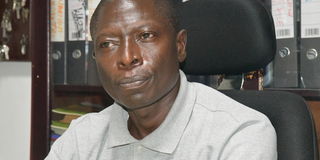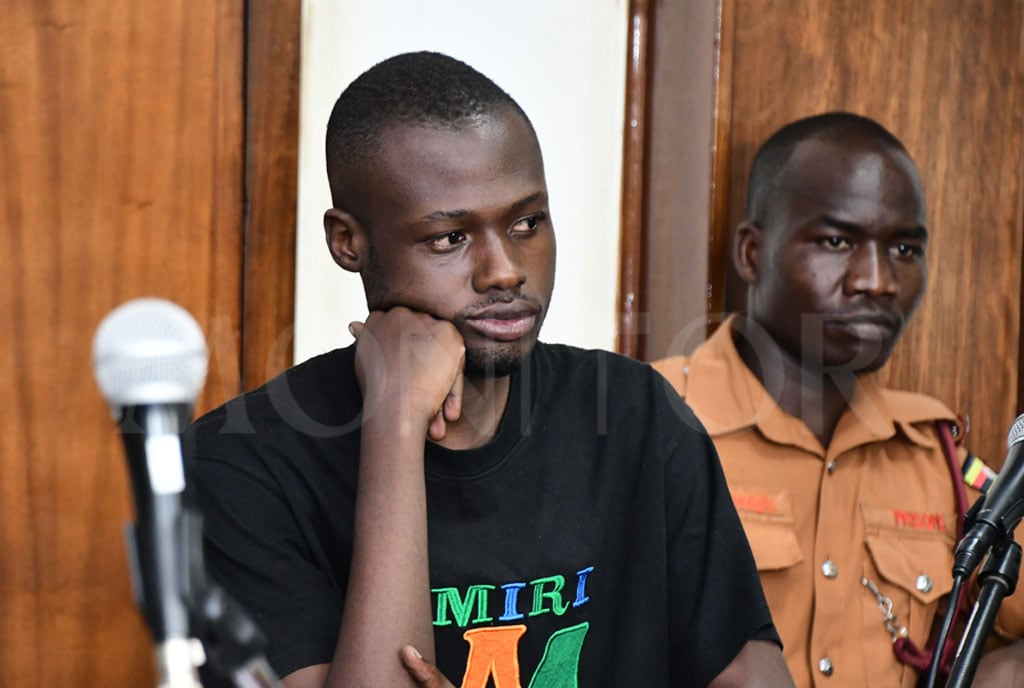Only the tough and dynamic will make it in the education sector - Lutaaya

Jimmy Lutaaya, the head teacher of St. Noa Girls Secondary School. PHOTO | EDGAR R. BATTE
What you need to know:
- Today marks the beginning of the full reopening of educational institutions since the outbreak of the pandemic almost two years ago. Stakeholders such as Jimmy Lutaaya, the head teacher of St. Noa Girls Secondary School predict tough times ahead before the situation returns to normal.
“Parents are frustrated, many have lost their jobs and as schools reopen, they have no idea how they will manage to take their children back to school. Some learners’ thoughts have been corrupted and are thinking of everything else but returning to school. Others have lost faith in their parents after realising their struggle during the lockdowns,” Jimmy Lutaaya, the head teacher of St. Noa Girls Secondary School paints the picture of the atmosphere as learners report to school after close to two years of lockdown.
During the interview, his phone repeatedly rings but he keeps muting the calls. After our conversation, he starts returning calls, most of which are to parents anxious to know the least amount they can raise in order for the school to accept their children back.
A parent says she is considering another school that is cheaper but he patiently explains why that would not be a good decision and promises to treat hers as a special case.
“Please look for money to cover 50 percent of the school fees then you can look for the other half during the course of the time as ‘our’ student receives education and school care,” he tells the parent.
Innovative initiatives
This confirms Lutaaya’s reputation which precedes him as an understanding headteacher who takes personal initiative to keep in touch with parents.
“He once told me that if I go to a bar planning to take three beers, I should have two and send him one. Only the money does not go to his pocket but goes directly to the school’s mobile money account and later automatically reflects as a deposit on school fees,” one parent explains.
Lutaaya and many other school heads may need to come up with innovative ideas in order to be able to open their institutions for returning learners after almost two years of lockdown.
“We require that parents or guardians pay 50 percent of the school fees then they can pay the other 50 percent later because the school currently doesn’t have any finances in its treasury,” he explains.
He adds, “But the good thing with us is we are not going to increase the fees. Different classes will continue to pay the different amounts they paid before. We know the challenges that the parents are going through.”
According to the head teacher it is unfair for government to provide funding to government schools and not to private schools, yet they play a complementary role in the local education sector. He urges the Minister of Education, Janet Kataaha Museveni to give more consideration to the fate of the private institutions and find a way of including them in their funding policies.
“We need the help of the Ministry of Education to rehabilitate privately owned schools just like they did with government schools. We have been in a lockdown where we were unable to generate any income but we are expected to have the same readiness as the government-funded school. We have always worked with the Ministry of Education to implement its policies I should hope that in turn it would consider availing funds to at least get us back on our feet,” the head teacher explains.
Like father like son
Lutaaya joined the teaching profession in 2001 as a fulfilment of his dream. He had seen his father, Paul Lusekera, serve in the same profession. “Teaching is a service. There is not much money to be made so if you come into it and expect to earn a lot, you’ll be disappointed.”
When he joined, he was earning Shs 300, 000 as gross salary. He was young and his parents were willing to step in when the salary couldn’t adequately cover his rent and basic needs.
He did ‘teaching practice’ at Makayi College Natete before being posted to St Noa Girls Secondary School as a teacher of geography and political science in 2001.
He qualified at National Teachers College in Nkozi where he acquired a diploma. He decided to upgrade by enrolling for a degree in education at Makerere University and later, a master’s degree in education at Uganda Martyr’s University Nkozi.
“The school administration, and other people have nurtured me. I appreciate the school for taking care of me all this long. It has seen me through the lockdowns and I am grateful. Living through the pandemic has not been easy. I initially depended on my savings, but time came when I depleted the savings yet I was not earning,” he recounts.
When his savings were depleted, the school supported him, and other staff members with basic items. When that avenue dried up too, he turned to some friends for sustenance but he is now considering taking out a bank loan in order to send his three sons back to school.
What the future holds
With the school open, again. “We have tried to renovate the school. We have tried to put Standard Operating Procedures (SOPs) in place so that the girls find us all ready. We worry that some of our students may not be able to come back since this is a girls-only school and yet the girl-child has been hit more by this pandemic,” he says.
At the close of schools by government in March 2019, the school had a student population of approximately 1,200 girls. When Senior Four and Senior Six returned to school briefly, six girls were missing. When the head teacher inquired from the parents he found out that the students had domestic issues which were beyond the school’s control.
Lutaaya seems to have better luck with the teaching staff.
“Many of them have a positive attitude towards coming back to work and it has encouraged me. In the meantime, they too need support to be able to return to their classrooms without nagging worries about the welfare of their families. So, as administration we shall see how we are going to support them immediately,” he reveals.
Helping learners heal
In addition to helping learners catch up with their academic studies, the head teacher says they are keen to offer some psycho-social support as a form of reorientation to school life.
“Very many issues have happened in their lives; some students have suffered various forms of loss, others are frustrated by the interference in their plans and they need professional help to make sense of their world,” he notes.
He adds, “Other students have got some money and they see no need of returning to school to study, after all we tell them to study and get money so the motivation to continue studying has died out. Some of the girls have become mothers so instead of coming back to school, a young mother will decide to nurse her child,” he notes.
Lutaaya also observes that not only learners have been affected, teachers too have faced consequences during the long break from teaching.
“Many of them were frustrated when schools remained firmly shut and were forced to turn to other activities to earn an income thus leaving the system. Some of these were excellent teachers whose expertise will be deeply missed. We are also not completely sure that those that return will still be as committed to teaching as they were before the disruption. They also have many problems to deal with, including broken families because of poverty,” the head teacher spells out issues schools will have to directly or indirectly deal with going forward.
Lutaaya says the school is now totally equipped to handle any possible outcome.
“We are prepared in every way possible. We now have the facilities to enable online teaching should the need arise,” he says.
He observes that teaching online is here to stay. “Teachers who have not yet embraced it, need to because without it now, it becomes extremely difficult for a teacher to pass on his knowledge to the learners effectively,” he says.
As a stakeholder in the education sector, Lutaaya would like some policies revised.
“If you look at the policy for the disabled, there is still so much that needs to be done. Although some policies were passed to aid them, most institutions did not implement them, for instance they still do not have the required facilities in place. Government needs to follow up and make sure the managers of the institutions are following the guidelines,” he elaborates.
He suggests that government should occasionally consult with those in the sector and pay attention on supervising to ensure policies are implemented.
“So, it requires stakeholder engagement before policies are passed instead of sitting somewhere in a certain office and pass policies,” he suggests.





